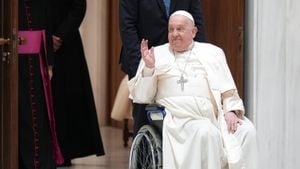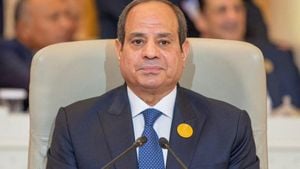Germany is poised for parliamentary elections this weekend, marking a significant moment following the fall of Chancellor Olaf Scholz's government. Current polls reflect Friedrich Merz of the CDU/CSU as the frontrunner, with the country closely watching as voter concerns shape the political discourse.
Recent surveys demonstrate the CDU/CSU leading with approximately 31% support, making it the top choice to reclaim the chancellorship. This would position Merz to restore conservative governance after Scholz's SPD, which languishes at about 15%. Meanwhile, the far-right Alternative für Deutschland (AfD) is expected to garner around 20% of the vote, yet their potential role remains contentious due to historic political exclusion.
Prominent themes heading to the polls include the economy, migration, and the AfD’s rise. The German economy is amid its third consecutive year of contraction, prompting widespread concern about job security and financial stability. Many voters fear the downturn has hit too close to home, with business owners vocalizing their distress over declining conditions.
Merz has crafted his campaign around the promise of tightening immigration controls, indicating strong opposition to the influx of asylum seekers. This shift, starkly different from former Chancellor Angela Merkel’s approach, suggests he is vying for the votes of those tempted by the AfD’s hardline stance. Merz emphasized, "We will not form any government with parties unwilling to significantly change the migration policy in Germany.”
The migration debate intensifies as public sentiment sways, with demonstrations erupting against the possibility of collaborative governance involving the AfD, whose extremist positions have garnered serious scrutiny. Activist Maren Loerzer, who has helped organize anti-AfD rallies, stated, "My greatest concern is the AfD's success in pushing boundaries, drawing us closer to fascism."
Scholarly perspectives support this apprehension. Wolfgang Schröder, a political scientist, remarked, "The core of any liberal democracy is the ability to compromise. Parties unwilling to do so pose threats to democracy itself." Indeed, Germany’s political history informs this vigilance; the memory of how authoritarian regimes have arisen via democratic means remains fresh.
This election isn't simply about which party leads; it’s also about which constituencies are represented. With around 20% of voters still undecided, the stakes are high. Many anticipate the fate of smaller parties like the FDP, Die Linke, and the newly formed Alliance by Sahra Wagenknecht will determine which coalition can be forged.
The “Brandmauer” (firewall), established post-World War II, has historically prevented mainstream parties from forming coalitions with radical right entities like the AfD. Recent legislative movements, particularly by the CDU to propose stricter asylum laws, have ignited debate about whether this firewall is sustained. Critics fear such motions risk dismantling the barriers established to protect democratic integrity.
The protests and calls for democratic protection against the perceived encroachment of the AfD indicate heightened civic engagement. Recently, around 40,000 demonstrators gathered in Berlin, vocally opposing any cooperation with the AfD. "We are the firewall!” they chanted, reinforcing the assertion among many Germans to preserve democratic principles.
The discussions around potential coalitions also reflect the broader discontent with established parties failing to address economic worries and migration fears adequately. It’s clear the next step after the elections will dictate not only party relations but also test the resilience of Germany’s democratic foundations.
With uncertainty looming, Germany stands at the threshold. The election on Sunday could reshape the political map of the nation, determine the chancellor, and address the pressing issues of migration and economic recovery. The results will dictate the immediate political future and how the country negotiates its historical challenges.



